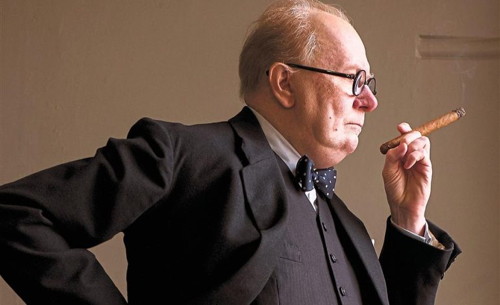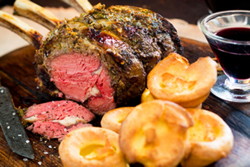Darkest Hour: Roast Beef and Yorkshire Pudding Recipe 🥁🥁🥁🥁🥁
/Year Released: 2017
Directed by: Joe Wright
Starring: Gary Oldman, Kristin Scott Thomas, Stephen Dillane, Ronald Pickup, Ben Mendelsohn, Lilly James
PG-13, 125 min.)
Genre: Drama
Academy Awards
Best Actor: Gary Oldman

“You cannot reason with a tiger when your head is in its mouth.” –Winston Churchill
“Four weeks that changed the course of history.” It doesn’t get much bigger than that. If you missed this tremendous film when it was in the theaters, watch it now!
The whole film is a masterpiece, but the two greatest ingredients are the man it portrays and the wonderful actor who portrays him. Here I defer to the great classical scholar, Victor Davis Hanson:
Actor Gary Oldman's masterful Churchill should be a sure Academy Award-winning performance. (He did, in fact win as Oscar for this performance.) Oldman reminds a generation of amnesiac global youth that nearly 80 years ago, the dogged defiance of a 66-year-old Victorian Englishman -- and not much over 5-foot-6 -- saved Western civilization from Nazi barbarism.
Gary Oldman is an actor’s actor, certainly not a marque name, and probably unknown to all but the more serious filmgoers. He is slender and somewhat youthful, certainly nothing like the rather rotund and round-faced Churchill. Yet he becomes Churchill in what may be Oldman's finest performance to date.
You may remember him as George Smiley from John le Carré’s Tinker Tailor Soldier Spy, where his director said of him, “Gary has all the star quality, yet he is also a chameleon.” In that film, George Smiley remembers the infidelity of his wife with a colleague. Oldman’s face as he portrays Smiley remembering this double betrayal is flawless, his pain all but hidden behind a mask of apparent tranquility.
Oldman’s Churchill is quite different from the icon we all know from his thundering speeches. Most of us remember hearing Churchill's inspiring words long after the fight for Western civilization had been settled in our favor. We forget the perilous times in which they were spoken. And the loneliness, courage, and vulnerability of the man who spoke them.
The film takes place over 4 weeks, literally the darkest hour for Britain and perhaps the world. Hitler has toppled most of Europe; he has pushed the embattled French to the brink of surrender, while the English Expeditionary Forces are cornered on the beaches of Dunkirk. Churchill is ushered in to replace an ailing Prime Minister Neville Chamberlain (Ronald Pickup), the “peace in our time” compromiser so poorly outmaneuvered by Hitler.
Churchill himself is a compromise, the only man acceptable to both sides of Parliament, and many, mostly within his own party, hold him in contempt.
King George IV: Why have I been forced to send for Churchill. His record is a catastrophe.”
Viscount Halifax:
He stands for one thing and one thing only: himself.
He’s a bully. We may have to replace him.
He’s an actor in love with the sound of his own voice.
So, it is not only Hitler’s Nazis who are against Churchill, but the backbiting members of his own party who scheme behind his back to oust him. At times, we wonder which is the greater foe.
Not just the scheming, but the acquiescence to a negotiated peace is infectious in the political crowd.
Viscount Halifax: We’re facing certain defeat on land, the annihilation of our army, and imminent invasion. We must negotiate peace talks.
Winston Churchill: When will the lesson be learned! You cannot reason with a tiger when your head is in its mouth!
Here the film takes a poetic license as it shows even Churchill considering such a course. It does so by inventing a scene of pure fiction where the people themselves, buoyed up by their Prime Minister’s inspiring words, help him reaffirm his decision to fight on.
In one of the few historical lapses in an otherwise superb film, Churchill is wrongly portrayed as seriously conflicted and about to consider the deal with Mussolini -- until he takes a subway ride and rediscovers the defiance of the average Londoner. The subway scene is pure fantasy. –Victor David Hanson
But the dire straights of Britain are no fantasy. They are entirely alone in those weeks of May 1940. A desperate call to America’s FDR yields little more than sympathetic words. (We would not get into the war until Pearl Harbor, over 1½ years away.)
Alone and under siege, Churchill agrees to a plan to save the British armed forces stranded at Dunkirk, some 400,000 of them. Actually, the core of the British army. If they are to be lost, there would be not much left. In desperation, Churchill calls for civilian craft to aid in the rescue. They hope to evacuate no more than 30,000 troops. But, in fact, with the nearly 700 civilian ships who volunteered, he brings home over 338,000 men.
But it not just the civilian boats that Churchill mobilized. As his political foe, Viscount Halifax remarked, “He mobilized the English Language and sent it into battle.”
We shall fight on the beaches, we shall fight on the landing grounds. We shall fight in the fields and in the streets, we shall fight in the hills. We shall never surrender! Winston Churchill, June 4, 1940
I still cannot read those words without a catch in my throat. Do not miss this masterful tribute to one of the greatest heroes of the 20th century.
–Kathy Borich

Trailer
Film-Loving Foodie
The embodiment of tradition and substance, our recipe befits a man who mirrors those qualities. English Roast Beef with Yorkshire Pudding must surely have been a favorite of Winston Churchill.
Serve with a glass of red wine to match the rare beef, and give a toast to a man of courage and resolve, who was unshaken in his beliefs even when it seemed all the world was against him.
“To you, Sir Winston.”
(Our Recipe comes from Different Drummer's own Appetite for Murder: A Mystery Lover’s Cookbook.
Roast Beef and Yorkshire Pudding

Place 5-pound beef roast fat side up on rack in shallow roasting pan. Sprinkle with salt and pepper. Insert meat thermometer so tip is in center of thickest part of beef and does not rest in fat. Do not add water.
Roast uncovered in 325 degree oven to desired degree of doneness: 125 to 130 for rare, about 1 3/4 hours; 140 to 150 for medium, about 2 1/4 hours. If desired, add potatoes after approximately 15 minutes. See directions for browned roast potatoes below. About 30 minutes before roast reaches desired temperature above, prepare Yorkshire Pudding Batter. Heat square pan, 9 x 9 x 2 inches, or oblong baking dish, 11 x 7 x 1 1/2 inches, in oven.
When roast reaches desired temperature, remove from oven; increase oven temperature to 425 degrees. Transfer roast to platter; cover lightly with aluminum foil. Pour off 1/4 cup drippings from roast pan; place drippings in heated square pan. Pour in pudding batter. Bake until puffed and golden brown, about 25 minutes. Cut into squares; serve with beef.
Yorkshire Pudding Batter
1 cup all-purpose flour
1 cup milk
2 eggs
1/2 teaspoon salt
Mix all ingredients with hand beater just until smooth.














